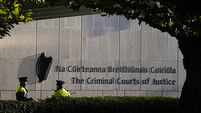Killer who carried out 'vicious' and 'cowardly' attack on man loses sentence appeal

Fiona Magennis
A killer who carried out a "vicious" and "cowardly" attack on a 55-year-old man who died 13 days later has failed in an appeal against the severity of his eight-year sentence.
Ian Connaghan had gone on trial in July 2023 alongside his brother Daniel Connaghan (44) accused of the murder of Michael ‘Mick’ Mulvey.
A Central Criminal Court jury returned a unanimous verdict of not guilty of murder for both men but convicted Ian Connaghan, from Ashington Rise, Navan Road, Cabra, Dublin 7, of manslaughter.
In dismissing Ian Connaghan’s appeal on Tuesday, Mr Justice John Edwards said given the “sheer viciousness” and “intensity” of the attacks perpetrated on Mr Mulvey, and the multiple aggravating factors in the case, the Court of Appeal was satisfied that the sentencing judge, Mr Paul Burns was correct to place it within the “high culpability” bracket when setting a headline sentence for the 35-year-old.
Mr Mulvey, a welder, died on November 27th, 2019, almost two weeks after he suffered injuries during two beatings on November 14th, 2019.
The court heard that on November 14th, 2019, Ian Connaghan was incensed following an encounter at a pedestrian crossing when Mr Mulvey and his partner, Pauline Matthews, were driving home from Tesco on the Navan Road and the defendant walked out in front of the deceased’s car.
Words were exchanged, during which Ian Connaghan said he would kill Mr Mulvey and burn his house down.
After the incident, Ian Connaghan then accosted Mr Mulvey near his home and proceeded to punch and kick the deceased a number of times before leaving him on the ground in Dublin’s Darling Estate.
Prior to this initial beating, Ian Connaghan phoned his older brother, Daniel, who made his way by car to meet his sibling and within minutes of the first assault, the two brothers again attacked Mr Mulvey on a traffic island hear the Halfway House pub in the middle of the busy Navan Road, punching and kicking him in the head and stomach.
A number of eyewitnesses in the case gave evidence that Mr Mulvey, who was very slight in stature, stood less than 5'3" tall and weighed less than ten stone, did not fight back against his taller attackers.
Mr Mulvey suffered fractures around his eye, bruising to his torso and two fractured ribs on his right side that punctured a lung.
After being discharged from hospital, Mr Mulvey “outwardly, appeared to be recovering” but around the time of his death appeared to be struggling with his breathing and had a cold.
On the morning of November 27th, Ms Matthews woke up to find Mr Mulvey deceased next to her.
Blunt force trauma
State Pathologist Dr Heidi Okkers found that Mr Mulvey's cause of death was blunt force trauma to the chest, with ischemic heart disease as a contributory factor.
However, the defence obtained a report from Professor Jack Crane, who found that the cause of death was ischemic heart disease.
The Director of Public Prosecutions had also sought an opinion from UK pathologist Dr Stuart Hamilton, who said that, in his view, Mr Mulvey had ischemic heart disease but that he would not have died but for the rib fractures.
Daniel Connaghan, also from Ashington Rise, was convicted of intentionally or recklessly causing serious harm to Mr Mulvey in November 2019 on the Navan Road, close to the Phoenix Park.
In December 2023, Mr Justice Burns sentenced Ian Connaghan to nine years imprisonment with the final year suspended, while Daniel Connaghan received five years with the final year suspended.
Appealing against the severity of the sentence imposed, Garnet Orange SC, representing Ian Connaghan, on Tuesday argued the sentencing judge had erred in placing the offence in the high culpability band attracting a headline sentence of between 10 and 15 years. Counsel said the appropriate bracket was the middle range of between four and 10 years.
Mr Orange argued that the assaults on the deceased were effectively “unpremeditated” and happened very shortly after an angry verbal confrontation between two individuals who were already on bad terms with each other.
He said there was very little evidence, if any, to suggest Ian Connaghan had injured Mr Mulvey to the extent that medical professionals would have considered that his life was in danger in the days following the attack.
Counsel outlined a number of comparator cases and said when considered in this light, the evidence in this case brought it more in line with the medium culpability range.
Mr Orange also referred to the sentence imposed on Ian Connaghan’s brother Daniel. He said notwithstanding the fact that Daniel Connaghan had been convicted of a different offence, there was a “significant” difference in the sentences imposed.
Seamus Clarke SC, representing the State, said the attacks were “way beyond” the type of case which would come within the middle range. Counsel said there were two violent incidents within a short space of time, while the victim was of slight frame and did nothing to defend himself.
He said the second attack was a “completely one sided offence” in which Mr Mulvey was attacked in a public area by Ian Connaghan and his brother Daniel, receiving kicks to the side and punches to the head while he was lying on the ground.
Delivering judgement at the three-judge court today, Mr Justice Edwards said the court could not agree that Connaghan’s case was more “akin to those indicative examples in the medium rather than the high category”.
“We are satisfied that, certainly in relation to the second incident, there was significant premeditation.”
He noted there was “callousness” shown towards the victim, that Ian Connaghan had enlisted the help of his brother and the pair had then “lain in wait” for Mr Mulvey.
The “sheer viciousness” of the attacks, particularly the second assault, was also an aggravating factor, he said.
Mr Justice Edwards said that given the manner in which the victim was set up, the viciousness of the attack and its intensity the court was “completely satisfied” that the existence of these multiple aggravating factors brought it into the higher range of sentences available to the judge.
“In the circumstances we are completely satisfied it was within the judge’s discrepancy to locate this on the lower end of the high range and we find no error in principle,” he said.
Mr Justice Edwards noted there had also been reference to the sentence given to Ian Connaghan’s brother, which had been lower.
“The principle of parity does not apply as their cases were not the same,” he said.





